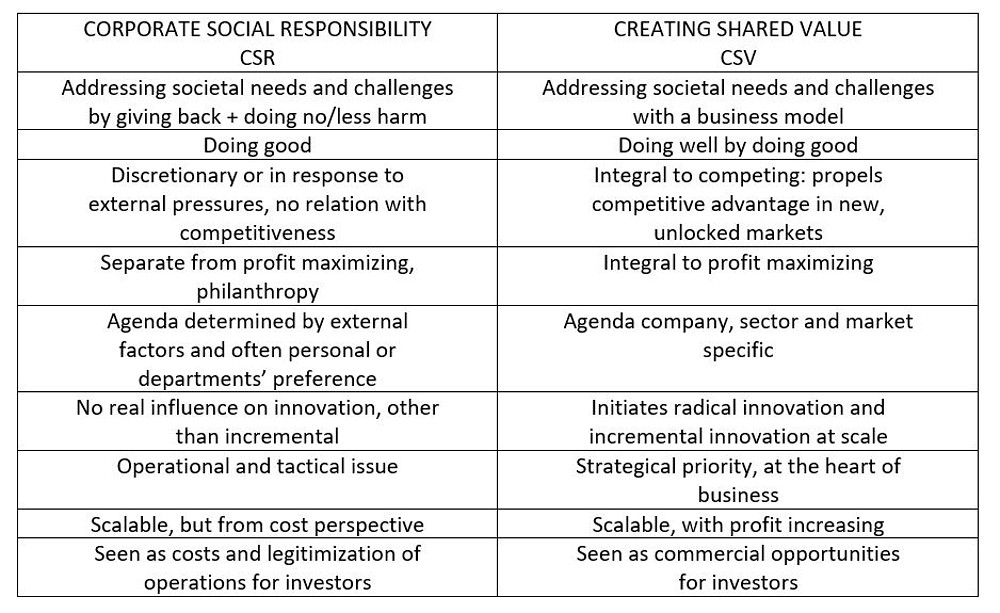The trailblazing researchers and business strategists Michael Porter and
Mark Kramer first introduced shared value in an article they wrote for
Harvard Business Review in 2006; and later expanded upon the concept in 2011
with their article, “Creating Shared
Value.” They
defined the concept of shared value as “policies and operating practices that
enhance the competitiveness of a company while simultaneously advancing the
economic and social conditions in the communities in which it operates.”
Building on the ambition to move from reducing negative impact to creating a
positive one, the CSV model has become the business-driven model pervading
sustainable global business and capital. The shared value model supports a
positive impact for society, the environment, finance, and all parties
involved.
It is characterized by the principle: Doing well and doing good are not mutually
exclusive. Financial success does not need to come at the expense of society or
the environment; and creating a positive impact on society and the environment
does not need to come at the expense of profit.
CSV shows that financial, societal and environmental benefits can be achieved
simultaneously. In fact, at the core of the model are societal and environmental
issues that serve as the drivers in propelling profitable shared-value business
cases across a wide spectrum of companies and industries. In this regard, CSV is
the ideal business model to support the realization of the UN’s
Sustainable Development Goals
(SDGs).
CSR v CSV
Porter and Kramer drew a distinction between the common activities related to
the well-established model of Corporate Social Responsibility (CSR) and their
new business concept of Creating Shared Value. They explained that “Shared Value
is not social responsibility, philanthropy, or sustainability; but a new way for
companies to achieve economic success.”

A global shift
Companies of all sizes throughout the world are embracing shared value. At the
2019 Shared Value
Summit,
hundreds of leaders from companies, nonprofits and governments came together to
help shape strategies and discuss innovative ideas that will accelerate this
model. These companies and many others are recognizing the benefits of shared
value, and are ready to move forward away from negative impact avoidance and
toward positive impact creation.
Companies can indeed contribute in meaningful ways. Porter and Kramer have
assessed the impact of CSV in agricultural cases, saying, “while Fair Trade can
increase farmers’ incomes by 10 percent to 20 percent, shared value investments
can raise their incomes by more than 300 percent.” Lifting people from poverty
is one way that CSV can help achieve the SDGs — in fact, shared-value business
cases often touch many SDGs at the same
time.
Case study: Nestlé
Nestlé’s ambitions are to create
shared
value
by having a positive impact on society and the environment, improving farmer
welfare, and driving environmental sustainability in coffee farming and
consumption. They believe that in order for their business to prosper in the
long term, so too must the communities with which they work. Nestlé describes
itself as a “catalyst for change going beyond its own operations.”
Nestlé has set 42 commitments to creating shared value, which are linked to
three overarching ambitions: “Enable healthier and happier lives; Help develop
thriving, resilient communities; And steward resources for future generations.”
The company’s ambitious goals are rolled into The Positive Cup
initiative,
which addresses these commitments. As part of this vision, its subsidiary,
Nespresso, set new goals in the areas of coffee sourcing and social welfare.
In this regard, they are concentrating efforts in a few key areas — aluminium
sourcing, resource use, product disposal, and resilience to climate
change
— which have become important drivers in the company’s commitment to play its
part in achieving the SDGs.
Nestlé puts these objectives into place with its 169 shared-value projects. One
example is how it is working with coffee
farmers
to provide training to improve their practices. This leads to higher-quality
beans, higher yields and higher revenues, with a smaller environmental
footprint. This shared-value strategy helps these bean farmers improve growing
techniques and farm management and become more resilient.
Nestlé’s strong stance on innovation has supported volume growth, with 30
percent of sales coming from products introduced or renovated in the last three
years. By improving efficiencies and reducing waste while innovating for
responsible production and consumption, Nestlé is working to create a positive
impact for the regions where they get their coffee beans. For example, Nespresso
is creating jobs and economic growth by pursuing innovative solutions to farmer
welfare, including the expansion of its AAA Farmer Future
Program
through a retirement savings plan for farmers in Colombia, and the provision
of training and engagement of 63,000 farmers across 11 countries. Nespresso also
trained a team of over 300 highly skilled agronomists who created shared value
for their value chain partners through an extensive agroforestry program, and
land management training initiatives in the AAA regions.
Additionally, the Nespresso Sustainability Innovation Fund was launched to
initiate and attract blended financing solutions — to find new financial
mechanisms to interest investors in socio-environmental projects that result in
positive impacts.
CSV is the business model that will accelerate the achievement of the SDGs. It
represents a game-changing shift from Corporate Social Responsibility and the
traditional mindset that business can either do good or make a profit, to a
business model that has the power to change the planet.
Get the latest insights, trends, and innovations to help position yourself at the forefront of sustainable business leadership—delivered straight to your inbox.
Marga Hoek is an international figurehead on sustainable business and capital.
Published Jul 14, 2020 2pm EDT / 11am PDT / 7pm BST / 8pm CEST